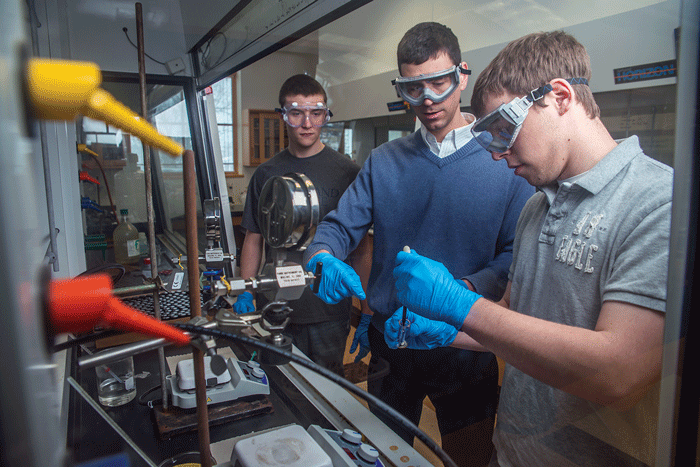Researchers develop sustainable plastic conversion method
University worked with Northland College faculty and students
RESEARCH TO REUSE: Northland College professor and UW-Eau Claire alumnus Nick Robertson, center, is collaborating with university staff to find a more sustainable way to reuse plastic. Submitted
April 23, 2014
Two professors from UW-Eau Claire and Northland College, along with student researchers, have developed a method for converting plastic into useful chemicals, which can sustainably reuse plastic waste materials.
Typically, a recycled soda bottle is cut up into tiny pieces and reused for other plastic products. Once in the waste stream, the materials are considered contaminated and cannot be used for new plastic soda bottles.
The research team can now change that. By converting the plastics back into chemicals, the researchers sterilize the material and it can be reused as “building blocks” for other plastics or chemical applications.
Northland College professor Nick Robertson said the practice is more sustainable than typical recycling because it completely reuses the product instead of forming it into another product.
“It’s not so much we are reducing the amount of plastic that we use, we are reducing the amount of plastic that we send to landfills and we are reducing the amount of oil we pump to make these other chemicals,” Robertson said.
Mike Carney, a professor of chemistry at Eau Claire and one of the project’s leaders, said the process opens up a bigger market where plastics can be reused.
“These building blocks aren’t just useful for making plastics,” Carney said. “They can be used for making a variety of things in the cosmetics industry, flavor industry, even … the pharmaceutical industry.”
Carney has been working with Robertson, a 2004 Eau Claire graduate, and students from both universities for the past year and a half. Northland College lacked the tools and resources for research that Eau Claire could provide.
Robertson, who researched with Carney while attending Eau Claire, said there is still a lot of work to be done. The process is currently not commercially viable because it is cheaper to drill more oil than break down plastics into pure chemicals.
“We were interested in seeing if we could take a technology to unzip the polymer into something that is more valuable, because if you can do that then all of a sudden you can use these waste streams to make other types of chemicals,” Robertson said.
The research was published in the journal Chemical Communication and featured online in the March issue of the Royal Society of Chemistry publication Chemistry World, and Carney said the work had generated some conversation.
In addition, the practice has sparked conversation about sustainability efforts and student-faculty research collaboration, because both universities support the practices. When Robertson attended Eau Claire he worked on student-faculty collaborative research with Carney. He said working on unsolved problems was an important and eye-opening experience as a student.
“It’s a lot of fun to see my students experience that as well,” Robertson said. “To see that we can work on problems that people don’t know the answers to. And if we can figure some of them out, that might inch the technology closer to being sustainable.”
Right now the researchers are focusing on the proof of concept development. Robertson said the researchers will be looking for a more economical catalyst to develop the work further. In the mean time, Robertson said he hopes the work will sparks questions with other researchers about how to make waste streams more sustainable as well as cost effective.











